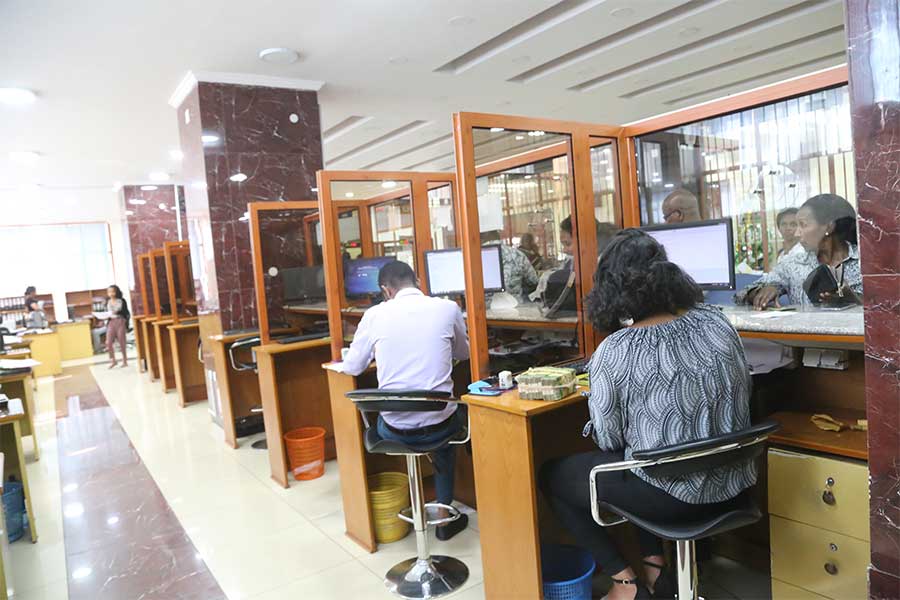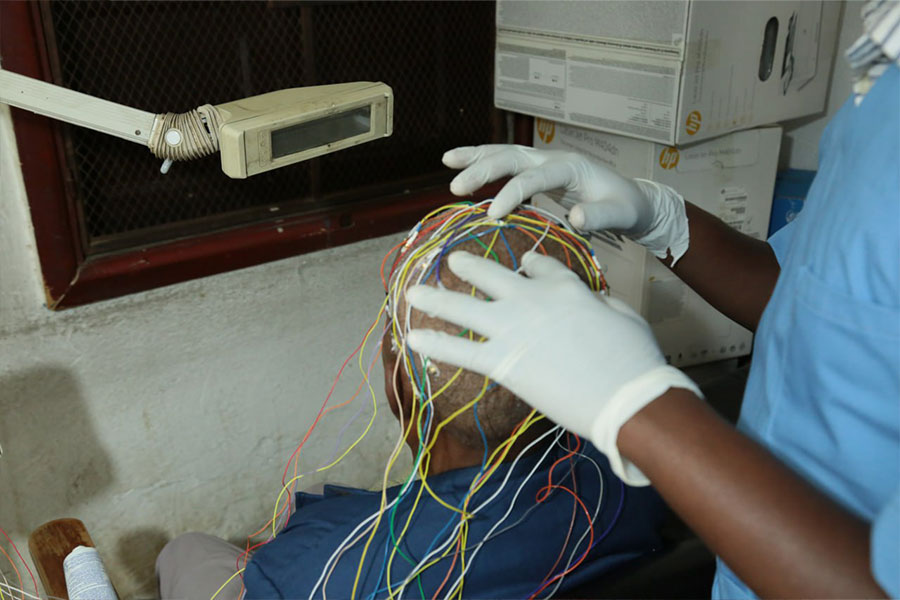
Commentaries | Feb 25,2023
Apr 25 , 2020
By Billene Seyoum ( Billene Seyoum is the spokesperson in the press secretariat of the Office of the Prime Minister. )
As the old saying goes, necessity is the mother of invention. In essence, the saying points to how problems encountered can pave the path to creative, adaptive and deep changes that meet the needs of tomorrow. Within the disruption of change lie the seedlings of inspiration and creativity that will enable humankind to adapt and thrive in a new normal.
Since the December 31, 2019, announcement by Chinese authorities to the World Health Organization (WHO) of the first pneumonia-like cases in Hubei province, more than 2.5 million individuals have now been confirmed to have the Novel Coronavirus (COVID-19), and over 175,000 people have lost their lives as a result. The global pandemic has led to unprecedented lockdowns of economies in many parts of the world, as governments grapple with adequate mitigation measures.
The immediate effects of the lockdowns, beyond helping to contain the spread of the virus, are also multifaceted. The notion that Earth is taking a break has often been cited to explain the decrease in levels of pollution related to reductions in mobility and industrial activities.
In the northeastern Italian city of Venice, for instance, the city’s grand water canals are appearing much clearer in the absence of its usual heavy boat traffic. Between January and February, NASA and European Space Agency satellite images showed clear reductions in nitrogen dioxide emissions in China and Italy.
What these will mean for broader global climate change mitigation goals may be too early to tell. Nevertheless, they force us to ponder the innovation and sustainable progress that we want to see in a post-COVID-19 world.
Yet the immediate and devastating impact of the pandemic and the “Great Lockdown” is an economic crisis. The International Monetary Fund (IMF) has referred to the COVID-19 induced lockdowns as the "worst economic downturn since the Great Depression," anticipating global growth in 2020 to fall by three percent.
Both developed and developing countries grappling with a health emergency will be confronted in parallel with an economic crisis equally pressing. The complexity added to such overlapping challenges is that no one can determine with certainty the duration and intensity of the global health crisis. In some countries, such as South Korea, that had effectively contained the spread, we see cases of relapse, while China is experiencing new infections. Such examples indicate the scale of the crisis and the uncertainty hovering over our default modus operandi.
Throughout human history, every crisis has introduced an opportunity for change. Indeed, the complexity of our globalised and interdependent lives may give the impression that a new reality is unimaginable. Yet as we find ourselves gripped by uncertainty and in flux, acknowledging the transition we are in and preparing for the inevitable new normal is a necessary step ahead.
The unavoidable prerequisite for survival as adapting to new circumstances is poignantly captured by a quote often attributed to Charles Darwin.
“It is not the strongest of the species that survives, nor the most intelligent that survives. It is the one that is the most adaptable to change.”
In the wake of the Black Death pandemic of the 14th century, estimated to have claimed over 50 million lives in Europe, various technological innovations emerged as a result of the unprecedented changes introduced.
Mechanical clocks, hourglasses, new medical ideas and the advent of agricultural technology is attributed to the period. Similarly, the so-called Spanish Flu of the early 1900s revolutionised the public health sector in the wake of the colossal deaths the pandemic caused.
The advent of health ministries in various countries around the world is considered a direct outcome of the Spanish Flu pandemic, as was the creation of an international bureau for fighting widespread diseases, which is said to be a precursor to the WHO. Similarly, international financial institutions such as the World Bank and the International Monetary Fund were created after the Great Depression and the Second World War to prevent the next war and global economic crisis.
What these historical lessons show us is that the global community finds itself uniquely positioned to capitalise on technological advancements and knowledge accumulated over the past century. While the role of the state is more pronounced currently in drawing mitigation strategies to circumvent the adverse effects of the health crisis and ensuing economic challenges, citizens are also actively engaging in digital spaces to fill the gaps.
Considering that there is no single predictable outcome of the pandemic, it is hard to forecast the exact advent of a post-COVID-19 reality. This means that innovations to systems, products and processes need to be quick, creative and happen in flux, responding to the dynamism of the situation.
As a pandemic of great magnitude that has occurred in our modern period, COVID-19 is calling upon the global community to rethink and shift the way we design and manage our healthcare, economic, transportation, political and social systems. This is to be done with great attention to sustainability, equity and human centeredness.
Since the first case of COVID-19 was confirmed in Ethiopia, we have seen communities pulling together their resources, time and energy toward collectively addressing the challenges we are faced with. From reinventing mobile washing basins and foot-operated soap dispensers, to masks, face shields and personal protective equipment produced by small businesses, we see a flexing of muscles in the realm of innovation, using materials and resources already at our disposal.
Large industries are turning their production lines to the call of the times and producing hand sanitiser, which was in extremely short supply only a few weeks ago. Textile manufacturers, hit by a decline in exports of their existing products, are fast adapting to meeting the supply gap in disposable masks, while other factories are exploring the production of much needed ventilators, test kits, medical suits and oxygen tanks. While there is no vaccine for COVID-19 at the moment, Ethiopian traditional medicine experts have also joined the global race to develop a vaccine.
All of these examples demonstrate the human capacity for resilience when tested and the ability to innovate and adapt to the times.
The fear and anxiety that the pandemic has caused are undeniable. The loss of livelihoods and negative impact on the most vulnerable sections of our society is clearly evident. As part of the global community, and as Ethiopians, we are faced with a grave challenge. Yet this health crisis also poses the opportunity for us to tap into the deepest wells of our knowledge, resources and potential to create solutions to this crisis.
As Prime Minister Abiy Ahmed (PhD) stressed in his April 4, 2020, address to the nation, we should apply collective leadership and “divert our energy from fear to collaboration, think and act together for our survival.”
Together and with ingenuity, we shall overcome.
PUBLISHED ON
Apr 25,2020 [ VOL
21 , NO
1043]

Commentaries | Feb 25,2023

Agenda | Jan 25,2020

Viewpoints | Nov 02,2024

My Opinion | Oct 11,2025

Agenda | Oct 28,2023

My Opinion | Nov 04,2023

Viewpoints | Jan 19,2024

Fortune News | Jan 18,2020

Commentaries | Jun 08,2019

Commentaries | Jan 23,2021

Dec 22 , 2024 . By TIZITA SHEWAFERAW
Charged with transforming colossal state-owned enterprises into modern and competitiv...

Aug 18 , 2024 . By AKSAH ITALO
Although predictable Yonas Zerihun's job in the ride-hailing service is not immune to...

Jul 28 , 2024 . By TIZITA SHEWAFERAW
Unhabitual, perhaps too many, Samuel Gebreyohannes, 38, used to occasionally enjoy a couple of beers at breakfast. However, he recently swit...

Jul 13 , 2024 . By AKSAH ITALO
Investors who rely on tractors, trucks, and field vehicles for commuting, transporting commodities, and f...

Oct 18 , 2025
The political establishment, notably the ruling party and its top brass, has become p...

Oct 11 , 2025
Ladislas Farago, a roving Associated Press (AP) correspondent, arrived in Ethiopia in...

Oct 4 , 2025
Eyob Tekalegn (PhD) had been in the Governor's chair for only weeks when, on Septembe...

Sep 27 , 2025
Four years into an experiment with “shock therapy” in education, the national moo...